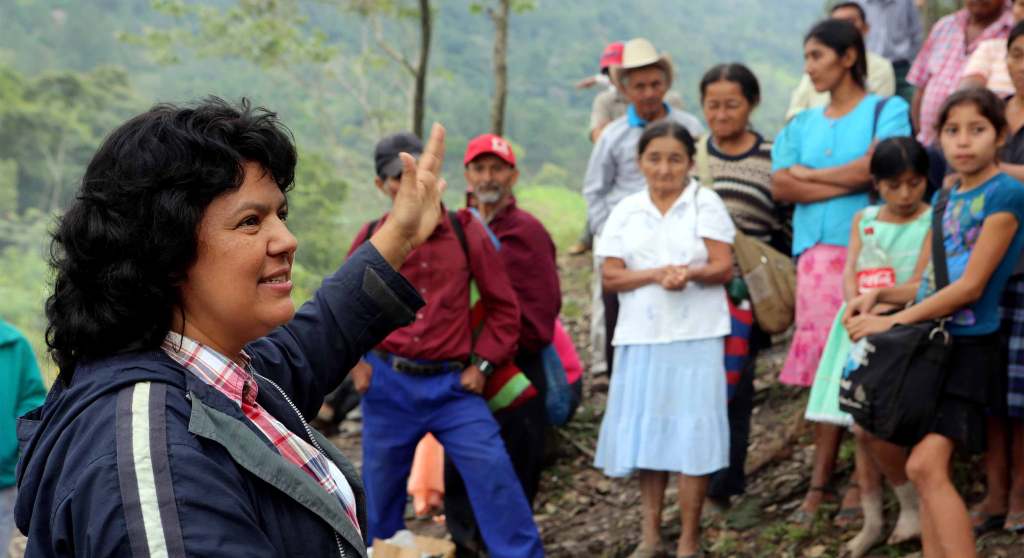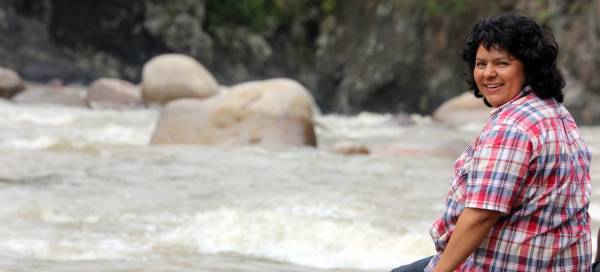
Women who protect rivers and forests make the world a better place. When someone attacks those women, we all suffer. It has now been a year since the courageous environmental activist and indigenous leader Berta Cáceres was murdered in Honduras, and those responsible still have not been brought to justice. Berta was just one of a dozen environmental defenders killed in Honduras last year; one of 123 killed since 2009. The lack of accountability only adds to the pain of her loss.
Berta was an energetic mother of four and a proud feminist indigenous woman, from a group called Lencas. Her mother, Austra, a schoolteacher, taught her to care for others from an early age.
“Mother nature—militarized, fenced-in, poisoned—demands that we take action.”
Berta Cáceres
Berta led the Civic Council of Popular and Indigenous Organizations of Honduras (COPINH), a local Lenca group, which works to keep wealthy outsiders from grabbing community resources. For Berta and many other Lencas, water, trees, soil, and seeds are not simply resources to be exploited for profit. They are the very essence of life, sacred elements of their culture.
After the Honduran government gave the DESA energy company a concession to build the $64 million Agua Zarca hydroelectric dam on the Gualcarque River without consulting the Lenca communities, COPINH fought the project tooth and nail. They managed to convince a Chinese company called Sinohydro, and the World Bank’s International Finance Corporation (IFC), to stop funding it. That victory helped earn Berta the prestigious Goldman Environmental Prize, the “Green Nobel.” It also made DESA’s owners and allies very angry, and led to a barrage of threats and attacks.
Whoever sent gunmen to break into Berta’s house just before midnight on March 2, 2016—and to fatally shoot her—undoubtedly thought they had silenced her forever.
Nothing could have been further from the truth. Though the police tried to blame the crime on thieves or a lovers’ quarrel, the public didn’t believe them. The international media covered the story extensively. A global outcry condemned Berta’s assassination, calling for an independent international investigation. The European Parliament, Amnesty International, the Vatican, 58 members of the United States Congress, UN Women, and hundreds of civil society organizations called for accountability. Berta became a global symbol of indigenous women’s struggle to protect their territories from corporate greed—and of the terrible price they’ve paid for those efforts.
The uproar was so deafening that the Honduran government was finally forced to act. Over a series of months they arrested eight people, including two linked to DESA, and four with military ties. But they still have not presented clear evidence of guilt or brought the accused to trial.
To find out who was really behind the killing and bring them to justice, Honduras will need to undertake a major independent international investigation, spurred by further international pressure on the government to act. In the meantime, faced with government intransience, Berta’s family and COPINH have sought assistance from the International Experts Advisory Group (GAIPE) to help them investigate the case. But that is no substitute for a high-level, independent, international investigation.
Canceling the Agua Zarca dam once and for all is also now more important than ever. Honduran law recognizes indigenous communities’ right to free, prior, and informed consent when it comes to such projects, but (as we see in this case) these rights have rarely been respected in practice. This has led to a vicious cycle of resistance, repression, and death.
But until the Honduran government takes strong action to stop corruption and influence peddling in decisions about mining, energy, plantation, timber, tourism, and fisheries projects—and focuses on the public good—the broader problems that fueled this situation will remain unchanged.
Even after her death, Berta can help us break that cycle. Her contagious optimism always inspired those around her, and continues to do so. Berta was simply unwilling to accept despotism or environmental destruction. “They fear us because we are fearless,” she liked to say. She gains new friends and allies every day. If we all speak out together, justice will prevail.


